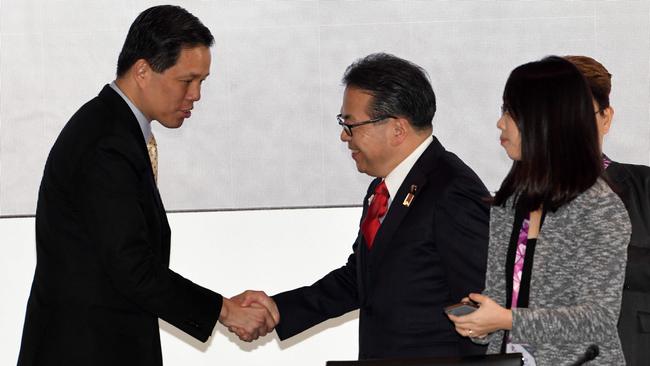China and Japan eager to strike an Asian free-trade deal
Asia’s next big free trade deal, which will include Australia, could be signed in Singapore in November.

Asia’s next big free-trade deal, which will include Australia, could be signed in Singapore later this year, with China and Japan keen to strike a deal.
Singaporean Trade Minister Chan Chun Sing said he expected the Comprehensive Economic Partnership (RCEP) — which takes in Australia, New Zealand, Japan, China, South Korea, India and the 10 members of the Association of Southeast Asian Nations — would be signed in November.
“We are looking for that broad agreement, that milestone to be achieved, or what we call a substantial conclusion, when the leaders meet at the end of the year,” he told local media.
The prospect of the regional trade deal has been under discussion for six years, but Asian sources say Japan and China are keen to finalise a deal as their ties are improving under Japanese Prime Minister Shinzo Abe.
Under pressure from the Trump administration, which is targeting it for a serious trade war, China is also keen to have more regional agreements.
Chinese sources say President Xi Jining would like to see a breakthrough in the talks.
“China has to take the initiative in forming a new international trade order,” Huo Jianguo, a former director of a research institute under China’s Ministry of Commerce, told the South China Morning Post. “The RCEP negotiations have dragged on for too long and China can’t afford another year of delay.”
RCEP does not include the US and is seen very much as an Asian region trade deal.
Donald Trump, who scrapped the proposed Trans-Pacific Partnership on coming to office in January last year, has said he would not be attending the meeting of APEC leaders in Papua New Guinea and the subsequent ASEAN-US meetings in Singapore in November.
Despite historical tensions, relations between China and Japan — the world’s second and third-largest economies — have been improving significantly over the past year.
China’s Premier Li Keqiang visited Japan in May, his first state visit since becoming premier in 2013, and Mr Abe is expected to visit China next month.
Chinese officials were also instrumental in cancelling a conference on Chinese “comfort women”, who were forced to work in Japanese brothels during World War 11, due to be held in Shanghai last month.
Mr Abe was quoted in the Japanese media as saying relations between China and Japan were back on a “normal track”, which was seen as paving the way for a trade agreement.
Negotiations on RCEP have dragged on for some time with countries having different views on how fast they are prepared to open up their markets.
Protectionist India is believed to be slower to agree to concessions while Japan has been more aggressive in pushing for an opening up of markets.
Trade Minister Simon Birmingham attended the last ministerial negotiations on RCEP in Singapore last month.
Senator Birmingham said yesterday that Canberra continued “to encourage all countries to work hard towards what would be one of the most economically significant trade agreements in the world covering the 10 ASEAN nations and other economic powerhouses such as China, India, Japan and South Korea”.
There was speculation yesterday that the leaders could agree on a broad deal in November, with provision for a gradual opening up of markets in more sensitive areas.
Mr Xi is hosting a number of African leaders for the third forum on China-Africa Co-operation that opened in Beijing yesterday.




To join the conversation, please log in. Don't have an account? Register
Join the conversation, you are commenting as Logout